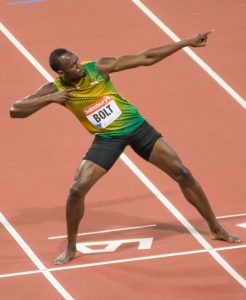43. Why Did Aubrey Graham Change His Name?
Why Did Aubrey Graham Change His Name?
1 Would you go to a concert starring Aubrey Graham? How about Katheryn Hudson or Peter Hernández? Abel Tesfaye? Joel Zimmerman? Never heard of them? This is not surprising, as these people are best known by their stage names. (Read to the end to find out who these people are.) People all over the world are changing the names they were given at birth—and they aren’t just celebrities.
2 Most celebrities change their names because they want to call themselves something more exciting, unique, or “cool.” Take Tom Cruise, for example. Would he have had the same success with his original name, Thomas Mapother? Would Caryn Johnson have found fame if she had not adopted the name Whoopi Goldberg? And would David Bowie have enjoyed long-term success if he had remained David Jones?
3 Other celebrities change their names because they want to honour someone, or because the new name has a particular meaning. Actress Olivia Wilde changed her last name from Cockburn to honour playwright Oscar Wilde. Canadian country singer Shania Twain started life as Eileen Edwards. Shania is an Ojibway word meaning “I’m on my way”; this seemed appropriate as Eileen was starting her singing career.
4 For some international celebrities, their real names are just too complicated for a global audience. Icelandic singer Björk’s full name is Björk Guðmundsdóttir; it was, obviously, much easier for her to simply go with Björk. Stefani Joanne Angelina Germanotta, an American performer with Italian and French-Canadian roots, also found it easier to go by a shorter name: she is known to the world simply as Lady Gaga.


5 However, it isn’t just stars who want to reinvent themselves. Every year around 22,000 ordinary Canadians change their names. Some changes are for routine reasons, such as marriage or divorce; other changes have their roots in more profound considerations. Some people adopt new names because they want to dissociate themselves from abusive situations; others want to lose the connection with a notorious family member, such as a parent who was convicted of a serious crime.
6 For many years, the children of immigrants to English-speaking countries have chosen to anglicize their names to enhance their opportunities for success. A good example from the United States is the Drumpf family, later known as Trump; their descendant Donald became President of the United States. In some cases, immigrants whose names have negative connotations, given the political times we live in, have changed their names to something more “English” to protect themselves from discrimination—Abdul might become Andy, for example.
7 In some cases, though, a person may choose to change his or her first name because that name is no longer a good match with who they are as an individual. Names are rarely neutral; they create pictures in people’s minds of what the bearer of the name looks like, how old they are, how intelligent they are, what their personality is like, and what they do for a living. Take Aubrey, for example. Aubrey is most likely a serious, studious gentleman, perhaps more at home in a library than on a concert stage. It is perhaps not surprising that Aubrey Graham wanted to be known by a name more fitting for a superstar.

8 A person’s first name can also have more serious repercussions, as it can affect the direction a person’s life takes. Professor David Figlio of Northwestern University in the USA has done research into the school life of children with different names. He has found that a female student with a feminine-sounding name, such as Elizabeth, will often choose courses in the humanities (literature, history, or foreign languages), while one with a more androgynous name, such as Alex, is more likely to take math and science. Perhaps Elizabeth’s teachers are influenced by the femininity of her name and, without realizing what they are doing, they steer her into a traditionally “female” area of study.
9 In another study, David Kalist and Daniel Lee have shown that boys with unusual or hard-to-pronounce names are more likely to end up as juvenile delinquents. They suggest that “juveniles with unpopular names may be more prone to crime because they are treated differently by their peers, making it more difficult for them to form relationships.” They also wonder whether these boys misbehave because of a dislike for their name.
10 Names are even associated with sports skills. It is fitting—and fortunate—that the fastest man alive has the name Usain Bolt. It is not so good for sportspeople who do not have a name to match their skills. Professor James Bruning from Ohio University asks who would be considered a better American football player, “someone whose name is Bronco or Colt, or someone named Francis or Percival?”

11 Middle names count, too. People who use their middle initials are seen as more intelligent, according to psychologists Wijnand A.P. Van Tilburg and Eric R. Igou. They gave the same essay to different groups of readers, but each essay had a different name. The essay written by “David F. Clark” was rated more favourably than the same one written by “David Clark”; the highest rating of all went to a paper written by “David F. R. P. Clark”. So, if you don’t have a middle name, you may want to consider adding one!
12 So, whether you aspire towards a career as a singer, a scientist, or a sports star, think carefully about your name. Whatever name you have, it forms an essential part of your identity. It is often something you will live with for your entire life—but if you really can’t face that thought, there is always the option of changing it. All you need is to be 19 years old and have $137 to spare; you can even do it online.
Who are the people listed in paragraph 1? Aubrey Graham is Canadian rapper Drake; Drake is actually his middle name. Katheryn Hudson is Katy Perry, and Peter Hernández is Bruno Mars. Abel Tesfaye is a Canadian singer better known as The Weeknd, and Joel Zimmerman is Canadian DJ Deadmau5, pronounced “dead mouse”; he named himself after a dead mouse he found in his computer.
Practice
Place each syllable below in the correct column.
| Syllable | Closed | VCe | Open | R-Controlled | Vowel Team |
| de | |||||
| ci | |||||
| sive | |||||
| gen | |||||
| der | |||||
| con | |||||
| tro | |||||
| ver | |||||
| sy | |||||
| ba | |||||
| by | |||||
| name | |||||
| il | |||||
| le | |||||
| gal |
What Says?
| 1. | 6. |
| 2. | 7. |
| 3. | 8. |
| 4. | 9. |
| 5. | 10. |
Spelling and Sentence Dictation
| 1. | 6. |
| 2. | 7. |
| 3. | 8. |
| 4. | 9. |
| 5. | 10. |
| 1. |
| 2. |
| 3. |
Review
Skimming.
When you skim a text, you read it quickly to get the gist of it. You are not concerned about understanding every small detail at this stage—you just want an overview. Skimming is what you do when you read the text in five minutes and jot down the main ideas.
How to skim
- Survey the text before you start reading. Look at any subheadings. If you are reading a whole book, look at the table of contents.
- Read quickly without stopping.
- Look at the first line or two of each paragraph; often the main idea is found there.
- If there is a section of the text, or a word or expression, that is hard to understand, don’t stop and struggle with it. Make a note in the margin, and you can come back to it later.
Scanning.
Scanning is also a form of quick reading, but it is different from skimming. Scanning is what you do when you want to find a specific piece of information.
How to scan
- Know what you are looking for. Usually this will be a specific fact, such as a name, date, number, or other piece of information. You are not looking for the general meaning here.
- Let your eyes drift down the page until you see what you are searching for.
- Then, read that sentence or section carefully to be sure you have the correct information.

